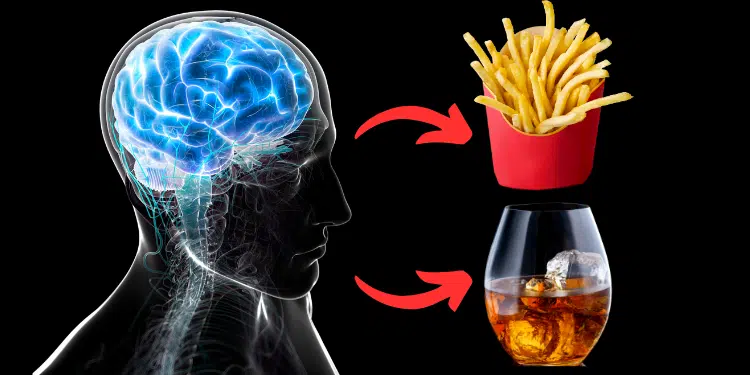What you eat doesn’t just affect your waistline; it also has a profound impact on your brain health.
While some foods can enhance cognition and protect against neurological decline, others can silently harm your brain over time, impairing memory, focus, and mood.
The connection between diet and brain health is stronger than you might think, and avoiding certain harmful foods is essential to maintaining optimal mental performance.
In this article, we’ll uncover the foods that could be silently destroying your brain and offer actionable tips to stop the damage and boost your cognitive health.
How Your Diet Impacts Brain Health
The brain is a highly active organ that relies on a steady supply of nutrients to function properly. Foods that are high in unhealthy fats, sugar, and artificial additives can:
- Cause inflammation.
- Impair neurotransmitter function.
- Contribute to oxidative stress.
- Increase the risk of neurological diseases like dementia and Alzheimer’s.
Understanding which foods to avoid and how to replace them with healthier alternatives is crucial for long-term brain health.
1. Processed Sugary Foods
Sugary snacks and beverages, including sodas, candies, and baked goods, are high in refined sugar, which spikes blood glucose levels and contributes to brain inflammation.
How It Harms Your Brain:
- High sugar intake has been linked to impaired memory and reduced brain volume in areas responsible for learning.
- Excess sugar can lead to insulin resistance, which negatively affects brain health.
What to Do Instead:
- Replace sugary drinks with water, herbal teas, or naturally flavored sparkling water.
- Satisfy sweet cravings with fresh fruits like berries, which are rich in brain-protective antioxidants.
2. Trans Fats
Trans fats, often found in margarine, fried foods, and processed snacks, are harmful to both cardiovascular and brain health.
How It Harms Your Brain:
- Trans fats contribute to inflammation, which can accelerate cognitive decline.
- Studies have linked high trans fat intake to poor memory and an increased risk of Alzheimer’s disease.
What to Do Instead:
- Choose healthy fats from sources like avocados, olive oil, nuts, and seeds.
- Read food labels and avoid products with “partially hydrogenated oils.”
3. Highly Processed Foods
Convenience foods like chips, frozen meals, and packaged snacks often contain high levels of salt, sugar, and unhealthy fats, as well as artificial preservatives.
How It Harms Your Brain:
- These foods promote inflammation and oxidative stress, leading to cellular damage in the brain.
- Regular consumption has been linked to depression, anxiety, and reduced cognitive function.
What to Do Instead:
- Opt for whole, minimally processed foods like fresh vegetables, lean proteins, and whole grains.
- Prepare meals at home to control ingredients and reduce processed food intake.
4. Aspartame and Artificial Sweeteners
Artificial sweeteners like aspartame, commonly found in diet sodas, sugar-free gum, and low-calorie desserts, can disrupt brain chemistry.
How It Harms Your Brain:
- Aspartame has been linked to behavioral and cognitive issues, including mood swings and memory impairment.
- It can alter neurotransmitter balance, affecting learning and mood regulation.
What to Do Instead:
- Sweeten foods and drinks naturally with honey, maple syrup, or stevia.
- Limit your consumption of diet and sugar-free products.
5. Foods High in Saturated Fats
Foods like fatty cuts of red meat, butter, and full-fat dairy products are high in saturated fats, which can harm brain function over time.
How It Harms Your Brain:
- Saturated fats contribute to the buildup of beta-amyloid plaques in the brain, a hallmark of Alzheimer’s disease.
- They can also reduce the brain’s ability to process information effectively.
What to Do Instead:
- Incorporate more plant-based proteins, such as beans, lentils, and tofu, into your diet.
- Choose lean cuts of meat and low-fat dairy products when possible.
6. Alcohol
While moderate alcohol consumption may have some benefits, excessive drinking is highly detrimental to brain health.
How It Harms Your Brain:
- Alcohol damages brain cells and disrupts communication between neurons.
- Chronic alcohol consumption has been linked to memory loss and an increased risk of dementia.
What to Do Instead:
- Limit alcohol to moderate levels (one drink per day for women, two for men).
- Explore non-alcoholic alternatives like mocktails or herbal infusions.
7. Foods High in Sodium
Excessive salt consumption from foods like canned soups, processed meats, and salty snacks can negatively impact brain function.
How It Harms Your Brain:
- High sodium intake is associated with reduced cognitive performance and an increased risk of stroke.
- It can also lead to high blood pressure, which restricts blood flow to the brain.
What to Do Instead:
- Season foods with herbs and spices instead of salt.
- Choose low-sodium or no-salt-added versions of packaged foods.
How to Stop the Damage and Protect Your Brain
1. Focus on Brain-Boosting Foods
- Leafy Greens: Rich in antioxidants and vitamins like folate, which supports cognitive health.
- Fatty Fish: High in omega-3 fatty acids, essential for brain function and reducing inflammation.
- Berries: Packed with antioxidants that protect brain cells from oxidative damage.
- Whole Grains: Provide steady energy and improve brain focus.
2. Stay Hydrated
Dehydration can impair memory and concentration. Drink plenty of water throughout the day and limit diuretics like coffee and alcohol.
3. Practice Moderation
You don’t have to eliminate all harmful foods at once. Gradually replace them with healthier alternatives to make sustainable changes.
4. Exercise Regularly
Physical activity improves blood flow to the brain, promotes the growth of new brain cells, and reduces inflammation.
5. Prioritize Sleep
Poor sleep affects brain detoxification processes, making it harder to repair damage caused by harmful foods.
The foods you eat play a critical role in your brain health.
While sugary snacks, processed foods, and trans fats can silently harm your brain over time, making smarter dietary choices can reverse the damage and protect your cognitive function.
By avoiding these harmful foods and incorporating brain-boosting alternatives, you can enjoy better memory, focus, and overall mental health.

